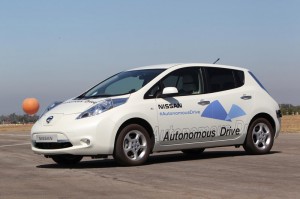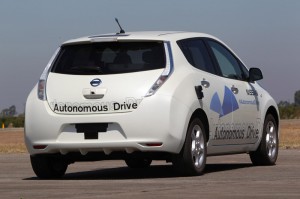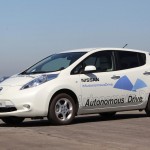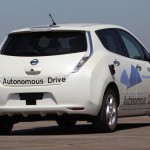Nissan Motor Co., Ltd. announced that the company will be ready with multiple, commercially-viable Autonomous Drive vehicles by 2020. Nissan announced that the company’s engineers have been carrying out intensive research on the technology for years, alongside teams from the world’s top universities, including MIT, Stanford, Oxford, Carnegie Mellon and the University of Tokyo.
Work is already underway in Japan to build a dedicated autonomous driving proving ground, to be completed by the end of fiscal year 2014. Featuring real townscapes – masonry not mock-ups – it will be used to push vehicle testing beyond the limits possible on public roads to ensure the technology is safe.
Nissan’s autonomous driving will be achieved at realistic prices for consumers. The goal is availability across the model range within two vehicle generations.
“Nissan Motor Company’s willingness to question conventional thinking and to drive progress – is what sets us apart. In 2007 I pledged that – by 2010 – Nissan would mass market a zero-emission vehicle. Today, the Nissan LEAF is the best-selling electric vehicle in history. Now I am committing to be ready to introduce a new ground-breaking technology, Autonomous Drive, by 2020, and we are on track to realize it.”
Said CEO Carlos Ghosn.

Nissan is demonstrating the breadth of the capability of its autonomous drive technology for the first time at Nissan 360, a huge test drive and stakeholder interaction event being held in Southern California. Laser scanners, Around View Monitor cameras, as well as advanced artificial intelligence and actuators, have been installed in Nissan LEAFs to enable them to negotiate complex real-world driving scenarios.
Nissan’s autonomous driving technology is an extension of its Safety Shield, which monitors a 360-degree view around a vehicle for risks, offers warnings to the driver and takes action if necessary. It is based on the philosophy that everything required should be on board the vehicle, rather than relying on detailed external data. The technology being demonstrated at Nissan 360 means the car could drive autonomously on a highway – sticking to or changing lanes and avoiding collisions – without a map. It can also be integrated with a standard in-car navigation system so the vehicle knows which turns to take to reach its destination.
A revolutionary concept like autonomous drive will have implications throughout the design and construction of cars. For example, collision-avoidance by machines with the capability to react more rapidly and with more complex movements than a human driver will place new demands on the chassis and traction control. Nissan is leveraging 80 years of research and development expertise to create a complete solution for autonomous drive.

A vehicle that looks out for you
Six million crashes in the US per year cost $160 billion and rank as the top reason of death for four- to 34-year olds. And, 93% of accidents in the US are due to human error, typically due to inattention.
With Autonomous Drive Nissan has the technology today to detect and respond to the situations causing this tragedy.
In the future, Autonomous Drive also means less input from the driver; U.S. drivers average 48 minutes per day on the road – hundreds of hours a year that could be used more productively.
For the aged or those with disabilities, Autonomous Drive offers another benefit: true independence and mobility for all.
*Full list of institutions currently involved: AIST(National Institute of Advanced Industrial Science and Technology, Carnegie Mellon University, Chuo University, Hiroshima University, The University of Iowa, University of Oxford, Stanford University, Massachusetts Institute of Technology, NAIST (Nara Institute of Science and Technology), Virginia Tech Transportation Institute, Russian State Scientific Center for Robotics and Technical Cybernetics, Kyushu University, Keio University, Nagoya University, Shinshu University, Tohoku University, Tokyo Polytechnic University, Tokyo University of Agriculture and Technology, UC Berkeley, The University of Tokyo, University of Tsukuba, Waseda University, University of Yamanashi.
Source; Nissan


